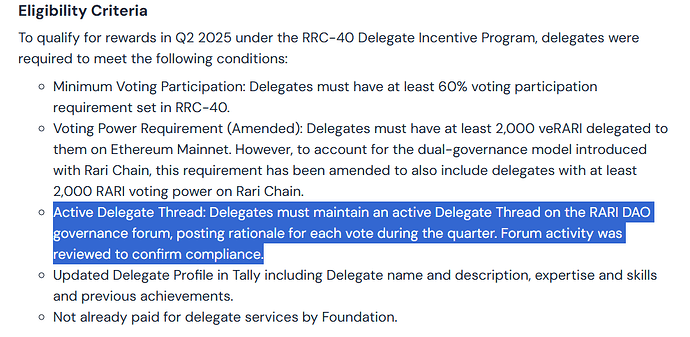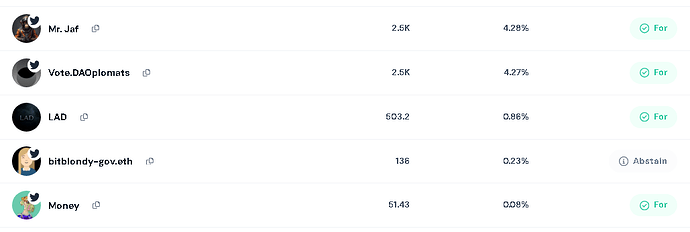@WinVerse could you please clarify which specific “other communities” you’re referring to that use vote-end dates instead of start dates to define quarterly scope? Also can you provide the relevent governance documentation here to serve as evidence? It’s important that such statements are backed with verifiable governance frameworks, not vague claims, expecting us to just take your word for it.
Regarding compliance, DAOplomats did not post a rationale for the Grow3dge Accelerator a proposal that they voted on, which closed on August 3rd, nearly two months before the end of Q3. They also didn’t post a rationale for RRC-52 on (RARI Chain) until two days ago, a full week after the proposal closed on October 3rd at 8:15 PM EST, which already functioned as a natural grace period. So even if we did remove RRC-52 from the Q3 report, DAOplomats will still not be eligible for rewards since you would still be missing a rationale for that vote as well.
Removing RRC-52, as you suggest, would also penalize @coffee-crusher, the proposal author who drafted and deployed it on-chain during Q3 and whose author points are tied to that period. Most delegates voted and posted rationales for it before September 30, all within Q3. Your suggestion would benefit a delegate team who missed the deadline while unfairly removing credit from one who met every rule and contributed on time.
This is exactly why the rationale-per-vote rule exists, it prevents delegates from retroactively batching posts after results are known, which already resulted in a delegate providing a rationale for a proposal they did not vote on, since they submitted all of their ratioanles on the last day of the quarter, as you’re suggesting. Check the “Accountability Note” in the report above. This can easily lead to governance malpractice as delegates may not accurately correlate their rationales with proposals they actually voted for within the quarter if they submit them all last minute. This is not the type of action we should be pushing for. By Q3 we should be following a standard and setting an example of responsible governance participation that follows a natural cadence, not a checkbox activity completed after the quarter closes to collect a stpiend.
The eligibility rules you’re referencing were clearly established in RRC-47, a proposal that you voted for and was approved unanimously by the DAO. Besides, Q1 included a grace period of one week to allow delegates to get adjusted to the program, but by Q3, all active delegates should already be aligned with posting a rationale before the end of the quarter.
Lastly, the report went through Foundation review before publication, since Q3 payments are being distributed directly by the Foundation rather than the DAO treasury. That review ensures accuracy, and accountability, which is why it was finalized after verification rather than rushed out prematurely.
The standard remains simple: vote, post a rationale for each vote you make, and do so within the quarter. That’s not punitive, it’s professional governance.

